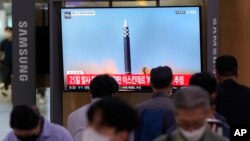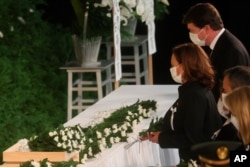North Korea conducted its second ballistic missile launch this week, hours before U.S. Vice President Kamala Harris was set to visit the demilitarized zone separating North and South Korea.
The North launched two short-range ballistic missiles late Wednesday toward the sea off its east coast, South Korea’s military said in an alert to reporters. Japan’s government also reported the launch of a probable ballistic missile. No further details were available.
The launch comes three days after North Korea tested a short-range missile. North Korea has now fired 34 ballistic missiles this year — a record high.
North Korea’s latest launch, though, is likely to be seen as particularly provocative, since it came as U.S. officials are planning for Vice President Harris to visit the DMZ.
Harris is in Tokyo to attend the state funeral of slain former Japanese Prime Minister Shinzo Abe. She has also held a series of bilateral meetings with Japanese, South Korean, and Australian officials.
Earlier Wednesday, Harris condemned North Korea’s Sunday launch, noting that it is “part of its ballistic weapons program which threatens regional stability and violates multiple Security Council resolutions.”
U.S. officials have not yet responded to the latest launch. But on Tuesday, a senior administration official said Harris’ DMZ stop is meant to signal U.S. commitment to defending South Korea.
“The key messaging that she’s talking about on this trip is how our defense commitments are ironclad. We know there’s been a lot of discussions with the Koreans about extended deterrence commitments. And to really put those words into action, we believe it’s a powerful signal of that,” the official said.
While in Seoul, Harris will also meet South Korean President Yoon Suk Yeol, a conservative who took office in May. Yoon has pushed to expand South Korea’s alliance with the United States and supports increased demonstrations of U.S.-South Korean military might.
Such demonstrations have increased in frequency and intensity amid predictions that North Korea will soon conduct its seventh nuclear test.





